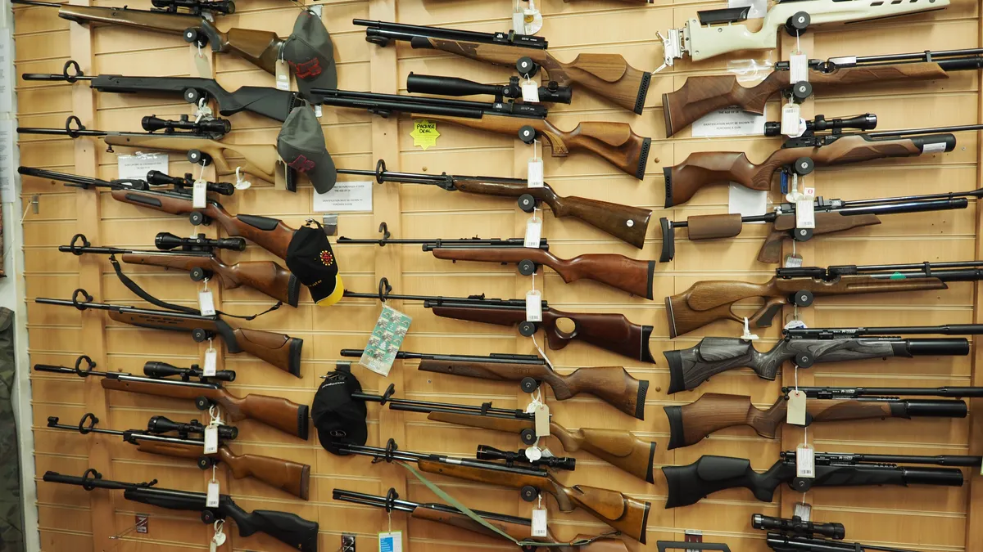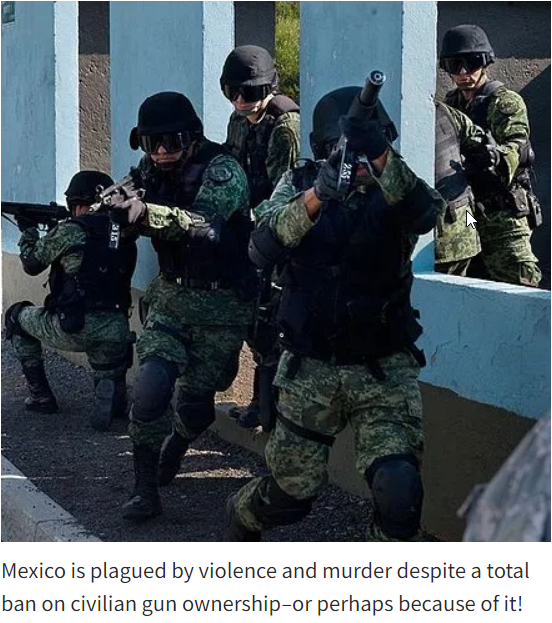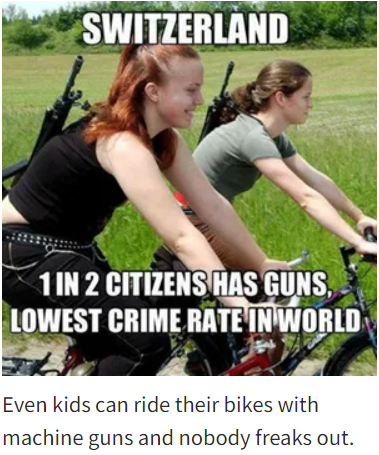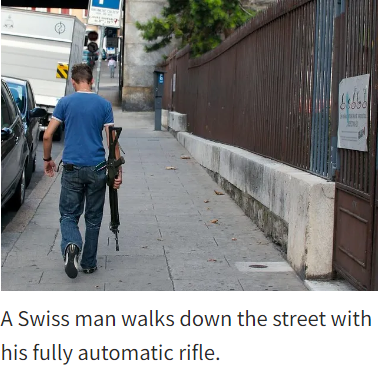
Guns: A Tale of Two Countries
By Alex Newman
Guns are not the problem, and I speak from personal experience. Growing up in two countries with dramatically different attitudes and laws on firearms — one nation where civilian gun ownership is banned, the other where it is mandatory for many — gave me unique insight into this issue.
As the debate on guns and gun control rages in America, I can’t help but think back on lessons learned during my childhood. It’s not quite a tale of two cities, but almost.
In the most peaceful country on earth, it was not unusual for me to see children on bikes or young men on trains openly carrying fully automatic weapons over their shoulder as if it was nothing. Nobody even bothered to look twice. Guns in closets or above kitchen cupboards were ubiquitous in family homes.
In one of the most violent nations on Earth, by contrast, only criminals and government agents — many of them vile criminals, too — could be seen with a weapon in public. And yet, murder and mayhem are ubiquitous there.
Let me share with you a bit about my upbringing. While I lived in eight different countries on four continents over the years, the two nations I’m going to tell you about stick in my mind — for very different reasons. I subconsciously learned a lot, and I think you will too.
Gun-free Mexico:
When I was four, we moved from the United States to Mexico for my dad’s job. Even as a little child, it was obvious to me that this was a very different place.
One of the first observations I remember was that every single house had a wall around it — oftentimes topped with broken glass, barbed wire, or even electric fence. I had never seen anything like that in Florida. And yet in Mexico, it was everywhere.
All I remember my mom saying about it when I asked her was that Mexico was not as safe as Florida, but that we would be fine and dad would keep us safe. She was right on both counts. But we did have a lot of close calls.
One of my most vivid memories from living in Mexico City for 7 years was coming home after a family vacation in the beach town Mazatlán to find our house burglarized.
At first, everything just looked like a giant mess. But as my family and I processed what was going on, I realized that the “mess” was actually the result of having burglars tear through everything in our home.
Perhaps the most frightening part of the experience was finding our own kitchen knives on every bed upstairs. We weren’t sure whether it was a warning or simply the result of the criminals dropping their weapons after ensuring nobody was home. But it was terrifying.
In any case, my dad promptly called his company’s lawyer as soon as he could find a phone, as the burglars cut our phone lines. The lawyer told us NOT to report the burglary to the police, as they would simply come check whether there was anything left to steal. Instead, it would be up to my dad to deal with it.
Dad immediately took several steps: He ordered a big metal gate for the top of the staircase that looked like jail bars, he had electric fencing put up on top of the wall around our house, he hired a new security firm to patrol our home …. And he bought an illegal firearm on the black market.
Of course, my little brother and I did not know he purchased a firearm until we found it one day years later snooping around in his closet. But as we got older, dad told us that keeping his family safe was more important to him than following bad laws.
It was a clear message to me that was left unstated but still rings in my mind today: Good guys need guns, because bad guys don’t care about murder and theft laws — much less gun-control regulations.
The other most vivid memories I have from Mexico involve being routinely harassed and extorted by the “federales,” the federal cops who ran wild in Mexico City.
Mexico is plagued by violence and murder despite a total ban on civilian gun ownership–or perhaps because of it!
 In the most extreme and terrifying incident, the police told my mom to pay the “fine” on the spot — known as a “mordida,” or bite — to avoid being hauled to jail and having my little brother and me on the side of a busy road. She broke down crying before finally handing over the money.
In the most extreme and terrifying incident, the police told my mom to pay the “fine” on the spot — known as a “mordida,” or bite — to avoid being hauled to jail and having my little brother and me on the side of a busy road. She broke down crying before finally handing over the money.
Our experience was not unique. The data on Mexico speaks for itself. Despite its near-total gun ban, Mexico suffers a murder rate that is orders of magnitude higher than the United States. Cartels often control the government. And corruption levels are unimaginable to an American.
After Mexico, we moved to Brazil, another nation with strict gun control plagued by crime and an out-of-control murder rate. Living there was wild. Many of my friends had armed bodyguards. All of us lived in communities and apartments protected by heavy security and huge walls.
Under the new president, though, gun control has been significantly scaled back, allowing average citizens to acquire firearms. According to a recent piece in the Wall Street Journal, homicide levels have dropped by 34 percent since the liberalization of gun laws.
Guns everywhere in Switzerland:
My time in Switzerland could not have been more different from my experiences in Mexico, Brazil and other gun-controlled nations across Latin America. In fact, Switzerland was almost the antithesis of Mexico and Brazil — especially when it came to guns, crime and corruption.
Even kids can ride their bikes with machine guns and nobody freaks out.
 Prior to arriving in Zurich, I had never seen a place where guns were not just legal, but mandatory and completely ubiquitous. They were everywhere! Whole towns would get together for shooting competitions and beer. Widespread gun ownership is considered a major part of Swiss culture.
Prior to arriving in Zurich, I had never seen a place where guns were not just legal, but mandatory and completely ubiquitous. They were everywhere! Whole towns would get together for shooting competitions and beer. Widespread gun ownership is considered a major part of Swiss culture.
For men, starting at adulthood, the government literally requires possession of a government-issued firearm and ammo, at least until the end of citizen-militia service (around age 34 for most). Even after militia service was complete, men have long been encouraged to keep their rifles.
A Swiss man walks down the street with his fully automatic rifle.
 Because men were required to train once a month, fully automatic rifles — “scary” looking “assault weapons” that cannot even be obtained in America without special (and expensive) ATF permits — were ubiquitous on the streets on Fridays and Sundays. Even kids went to the range.
Because men were required to train once a month, fully automatic rifles — “scary” looking “assault weapons” that cannot even be obtained in America without special (and expensive) ATF permits — were ubiquitous on the streets on Fridays and Sundays. Even kids went to the range.
It is hard to explain it to people who have never experienced it — even to Americans who cherish the Second Amendment. In America, if somebody walks down the street with an “assault rifle,” the police department is deluged in calls, even if no laws are being broken.
In Switzerland, it was completely normal to see young men in civilian clothes shopping at a grocery store, walking around downtown, or getting on public transportation with their “assault weapons” slung over their shoulder. Nobody batted an eye — even the foreigners got used to it quickly.
And yet, contrary to the prognostications of self-styled American experts and TV “talking heads,” Switzerland is an oasis of peace and tranquility. Murder and crime rates are among the lowest in the world. The president can often be found taking the train alone, without hordes of “security” personnel. Gang violence and corruption are almost unheard of.
Their nation is secure from outside threats, too. In fact, in part due to the widespread gun ownership and general proficiency with weapons, the Swiss have not fought a war in centuries. Even National Socialist gun-control fanatic Adolf Hitler knew better than to mess with his tiny Alpine neighbor.
If gun control worked, and civilian gun ownership were truly problematic, nations like Mexico and Venezuela would be peaceful utopias, and Switzerland would be a war zone. The reality is just the opposite.
In my experience, widespread gun ownership keeps a people safe from crime — and the far more deadly threat of government tyranny. If you don’t believe me, take a trip to Mexico and Switzerland and see for yourself.
Alex Newman
Alex Newman is an award-winning international journalist with a global reputation for hard-hitting reporting & the founder of Liberty Sentinel.
Published with permission of libertysentinel.org